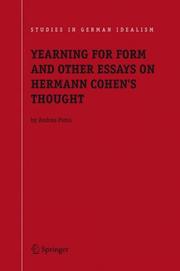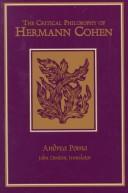| Listing 1 - 10 of 17 | << page >> |
Sort by
|

ISBN: 1280612541 9786610612543 140203878X 1402038771 9048169879 Year: 2006 Volume: v. 5 Publisher: Dordrecht ; [London] : Springer,
Abstract | Keywords | Export | Availability | Bookmark
 Loading...
Loading...Choose an application
- Reference Manager
- EndNote
- RefWorks (Direct export to RefWorks)
Hermann Cohen’s philosophy has now, finally, received the recognition it deserves. Cohen's thought undoubtedly has all the characteristics of a classic. It faced the great problems of philosophical tradition, with full critical awareness and, at the same time, with the capacity to open up new, original routes. It represents one of the last expressions of great systematic thought. The papers collected in this volume deal with different aspects of Cohen’s thought, ethical, political, aesthetic and religious aspects in particular. However, they all represent attempts to follow the ubiquitous presence of certain important themes in Cohen and their capacity for containing meanings that cannot be limited to a single philosophical sphere: themes that are keys to reading unity of inspiration in his thought, which is more deeply imbedded than the exterior architectural unity of his work. The search for the fundamental themes behind Cohen is an important task, if we wish to see this philosopher as a present-day vital point of reference, and not only as a monument of the past.
Jewish philosophy. --- Cohen, Hermann, --- Philosophy. --- Aesthetics. --- Ethics. --- Religion --- Philosophy of Religion. --- History of Philosophy. --- Deontology --- Ethics, Primitive --- Ethology --- Moral philosophy --- Morality --- Morals --- Philosophy, Moral --- Science, Moral --- Philosophy --- Values --- Beautiful, The --- Beauty --- Esthetics --- Taste (Aesthetics) --- Art --- Criticism --- Literature --- Proportion --- Symmetry --- Mental philosophy --- Humanities --- Psychology --- Jews --- Philosophy, Jewish --- Philosophy, Israeli --- Kohen, Herman, --- Kohen, Yeḥezḳel, --- Cohen, H. --- כהן, הרמן --- כהן, הרמן, --- כחן, הרמן --- Philosophy (General). --- Religion—Philosophy. --- Radio broadcasting Aesthetics --- Aesthetics --- Philosophy—History. --- Moral Philosophy and Applied Ethics.
Book
ISBN: 3319528122 3319528114 Year: 2017 Publisher: Cham : Springer International Publishing : Imprint: Springer,
Abstract | Keywords | Export | Availability | Bookmark
 Loading...
Loading...Choose an application
- Reference Manager
- EndNote
- RefWorks (Direct export to RefWorks)
This book examines the concepts behind a philosophical project on postmodernism: the social and cultural condition of our time, the age of the achieved capitalism. It proposes an original theory of postmodern humanism based on the absence of form and describes the development of philosophical thought as a musical “cadenza” that produces meaning in the empty space between the past of the modern and the future of the postmodern. The book focuses on three main postmodernist themes: the denial of identity and the assertion of the differences, the shattered subject, and the absence of teleology in history and politics. .
Postmodernism. --- Post-modernism --- Postmodernism (Philosophy) --- Arts, Modern --- Avant-garde (Aesthetics) --- Modernism (Art) --- Philosophy, Modern --- Post-postmodernism --- Ethics. --- Critical theory. --- Postmodern Philosophy. --- Critical Theory. --- Critical social theory --- Critical theory (Philosophy) --- Critical theory (Sociology) --- Negative philosophy --- Criticism (Philosophy) --- Rationalism --- Sociology --- Frankfurt school of sociology --- Socialism --- Deontology --- Ethics, Primitive --- Ethology --- Moral philosophy --- Morality --- Morals --- Philosophy, Moral --- Science, Moral --- Philosophy --- Values --- Post-Modern Philosophy. --- Moral Philosophy and Applied Ethics.
Book
ISBN: 9789400750302 Year: 2013 Publisher: Dordrecht [etc.] Springer
Abstract | Keywords | Export | Availability | Bookmark
 Loading...
Loading...Choose an application
- Reference Manager
- EndNote
- RefWorks (Direct export to RefWorks)

ISBN: 1438416296 0585067953 9780585067957 9780791431856 0791431851 9780791431863 079143186X 0791431851 079143186X 9781438416298 Year: 1997 Publisher: Albany State University of New York Press
Abstract | Keywords | Export | Availability | Bookmark
 Loading...
Loading...Choose an application
- Reference Manager
- EndNote
- RefWorks (Direct export to RefWorks)
This is a translation from the Italian of a study of the work of Hermann Cohen, a figure generally recognized as the most significant Jewish thinker of the past 100 years.
Cohen, Hermann, --- Kohen, Herman, --- Kohen, Yeḥezḳel, --- Cohen, H. --- כהן, הרמן --- כהן, הרמן, --- כחן, הרמן --- Philosophy, Modern --- Philosophy --- Philosophie. --- Jüdische Philosophie. --- Filosofie.
Book
ISBN: 8842517127 9788842517122 Year: 1995 Publisher: Milano: Mursia,
Abstract | Keywords | Export | Availability | Bookmark
 Loading...
Loading...Choose an application
- Reference Manager
- EndNote
- RefWorks (Direct export to RefWorks)
Digital
ISBN: 9781402038785 Year: 2006 Publisher: Dordrecht Springer
Abstract | Keywords | Export | Availability | Bookmark
 Loading...
Loading...Choose an application
- Reference Manager
- EndNote
- RefWorks (Direct export to RefWorks)
Philosophy --- General ethics --- History of philosophy --- Religious studies --- ethiek --- filosofie --- geschiedenis --- godsdienstfilosofie
Digital
ISBN: 9789400750319 Year: 2013 Publisher: Dordrecht Springer Netherlands
Abstract | Keywords | Export | Availability | Bookmark
 Loading...
Loading...Choose an application
- Reference Manager
- EndNote
- RefWorks (Direct export to RefWorks)
This book provides an analytical interpretation of Leibniz's 'Essais de Théodicée' with wide-ranging references to all his works. It shows and upholds many thesis: Leibniz's rational conception of faith, his rational notion of mystery, the reformation of classical ontology, and the importance of Leibniz's thought in the tradition of the critical idealism. In his endeavor to formulate a theodicy, Leibniz emerges as a classic exponent of a non-immanentist modern rationalism, capable of engaging in a close dialogue with religion and faith. This relation implies that God and reason are directly involved in posing the challenge and that the defence of one is the defence of the other. Theodicy and logodicy are two key aspects of a philosophy which is open to faith and of a faith which is able to intervene in culture and history.
Philosophy --- Metaphysics --- General ethics --- History of philosophy --- Religious studies --- ethiek --- filosofie --- geschiedenis --- godsdienstfilosofie --- metafysica
Digital
ISBN: 9783319528120 Year: 2017 Publisher: Cham Springer International Publishing
Abstract | Keywords | Export | Availability | Bookmark
 Loading...
Loading...Choose an application
- Reference Manager
- EndNote
- RefWorks (Direct export to RefWorks)
This book examines the concepts behind a philosophical project on postmodernism: the social and cultural condition of our time, the age of the achieved capitalism. It proposes an original theory of postmodern humanism based on the absence of form and describes the development of philosophical thought as a musical “cadenza” that produces meaning in the empty space between the past of the modern and the future of the postmodern. The book focuses on three main postmodernist themes: the denial of identity and the assertion of the differences, the shattered subject, and the absence of teleology in history and politics. .
Philosophy --- General ethics --- Sociological theory building --- Sociological theories --- sociale analyse --- ethiek --- postmodernisme (filosofie) --- kapitalisme
Book
Year: 1974 Publisher: Torino : Rosenberg & Sellier,
Abstract | Keywords | Export | Availability | Bookmark
 Loading...
Loading...Choose an application
- Reference Manager
- EndNote
- RefWorks (Direct export to RefWorks)
Book
Year: 1981 Volume: 6 Publisher: Torino : Filosofia,
Abstract | Keywords | Export | Availability | Bookmark
 Loading...
Loading...Choose an application
- Reference Manager
- EndNote
- RefWorks (Direct export to RefWorks)
| Listing 1 - 10 of 17 | << page >> |
Sort by
|

 Search
Search Feedback
Feedback About UniCat
About UniCat  Help
Help News
News